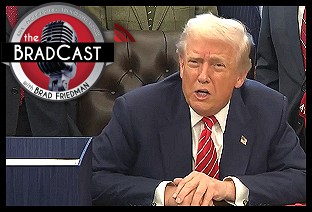[This article now cross-published by Salon...]
 A Circuit Court judge has resoundingly rejected Arkansas' new Photo ID restrictions on voting, declaring the law to be "null and void" and in violation of the state's Constitutional right to vote.
A Circuit Court judge has resoundingly rejected Arkansas' new Photo ID restrictions on voting, declaring the law to be "null and void" and in violation of the state's Constitutional right to vote.
Last year, after Republicans took over the Arkansas statehouse for the first time since Reconstruction, they passed an onerous Photo ID restriction law for voting. The Democratic Governor Mike Beebe vetoed the new restrictions, but that veto was subsequently overridden by the Republican legislature.
Pulaski County Circuit Court Judge Timothy Davis Fox' 2-page Summary Judgement [PDF] finds in favor of plaintiffs in the case, the Pulaski County Election Commission and against both the defendant, the Arkansas State Board of Election Commissioners, as well as the Republican Party of Arkansas which intervened on behalf of the Board of Election.
In his Thursday ruling, Fox found the law to be "unconstitutional in that it violates Articles 3, Section 1 and Article 3, Section 2 of the Arkansas Constitution."
Section 1 of Article 3 details the "Qualifications of Electors" in the Arkansas state Constitution, declaring that, "Except as otherwise provided by this Constitution, any person may vote in an election in this state who is: (1) A citizen of the United States; (2) A resident of the State of Arkansas; (3) At least eighteen (18) years of age; and (4) Lawfully registered to vote in the election."
Section 2, on the "Right of Suffrage" states that "Elections shall be free and equal. No power, civil or military, shall ever interfere to prevent the free exercise of the right of suffrage; nor shall any law be enacted whereby such right shall be impaired or forfeited, except for the commission of a felony, upon lawful conviction thereof."
Given the very clear and straightforward language of the state Constitution, this seems to have been a very easy case. Republicans, however, are reportedly preparing to appeal the ruling...
Opponents of the Arkansas Photo ID law contend that, like other similar statutes being passed by Republicans across the country, it would serve to disenfranchise those without the very narrow type of state-issued Photo ID required by the new law. Voting rights advocates point out that there are more than 20 million legally eligible voters in the U.S. who do not have the type of Photo ID needed to vote under such laws. The vast majority of those voters, they have shown, are poor, minorities, students and the elderly --- all blocks which, coincidentally, tend to vote for Democrats more than Republicans.
Under the newly rejected Arkansas law, as MSNBC's Zachary Roth points out, "Voters without ID must cast provisional ballots, then go to the county clerk to affirm that they’re too 'indigent' to afford ID. And unlike some other states’ ID laws, this one does nothing to help voters obtain identification, such as providing transportation to government offices."
The Arkansas law, Act 595 [PDF] law went even further than most similar laws being enacted around the country, in that it requires a photocopied ID to be included with absentee ballots, as well as when voting in person. Notably, however, it does not require strict Photo ID for absentee voters. When voting by absentee, the law allowed, in addition to state-issued Photo ID, for the use of "a copy of a current utility bill, bank statement, government check, paycheck, or other government document that shows the name and address of the voter." Those provisions would not be allowed for in-person voters.
Where voter fraud occurs in the U.S., it tends to be via absentee ballot rather than in-person polling place impersonation, which is exceedingly rare in this country. Nonetheless, wholly unsubstantiated claims of polling place fraud tend to serve as the ostensible basis for most such GOP laws. Absentee voters, however, which have historically leaned Republican in many jurisdictions, are rarely, if ever, required to include any ID at all when voting under such laws.
This challenge to the AR law was originally based on a challenge to the rules for how voters who did not include a photocopied ID with their absentee ballot should be handled. Instead of ruling only on that point, Fox struck down the law in its entirety.
Similar polling place Photo ID restrictions enacted by Republicans elsewhere have recently been repeatedly rejected by the courts in others states, such as in Wisconsin, where the law was found to have violated that state's Constitution, and in Pennsylvania where a judge recently found the Keystone state Republicans' draconian polling place Photo ID restriction was in violation of that state's Constitution.
The U.S. Department of Justice is currently challenging polling place Photo ID restriction laws in federal courts in Texas and in North Carolina, arguing that the laws discriminate against racial minorities in violation of both the U.S. Constitution and the still-standing parts of the Voting Rights Act (VRA) of 1965. Last year, the U.S. Supreme Court gutted a key provision of that Act, arguing that the formula for determining the list of jurisdictions --- mostly states in the South --- that were subject to the landmark law's special protections against minority disenfranchisement, was unconstitutional and no longer needed in many of those jurisdictions.
In the wake of that SCOTUS ruling, states like TX and NC rushed to immediately enact voting restrictions that had previously been repeatedly rejected as a violation of the VRA.
In Arkansas, early voting for the May 20 state primary begins in about 10 days. Democratic Sen. Mark Pryor will be defending his seat in the general election this year, and is believed by some to be in danger of losing it, though a recent New York Times poll found that Pryor held a commanding 46% to 36% lead over his presumed opponent Rep. Tom Cotton. The RealClearPolitics polling average for the race shows Pryor up by just over 2 points in what they currently consider to be a "Toss Up" race.
If the race is as close as predicted by some, turning away thousands of otherwise eligible voters from the polls under the new Republican law could give the GOP the edge they need to take the race and, in the bargain, a majority in the U.S. Senate.
Last week, the ACLU filed its own separate lawsuit against the Arkansas law on behalf of four voters, also arguing that it was in violation of the state Constitution and seeking to bar enforcement of the law prior to the May 20th primary.
UPDATE 4/27/2014: Our legal analyst Ernie Canning has a few more important details on this case, in comments below, now that the judge's full opinion [PDF] has been released...
CORRECTION: We had originally reported that Pennsylvania's polling place Photo ID restriction had been struck down in federal court. In fact, it was struck down in state court, as a violation of the Keystone State's constitution. The story above has been corrected.


 Court Blocks Hegseth Censure of Sen. Mark Kelly
Court Blocks Hegseth Censure of Sen. Mark Kelly Harpy Tantrums, Legal Losses, Election Fails, Retreating ICE and Other Hopeful Signs: 'BradCast' 2/12/26
Harpy Tantrums, Legal Losses, Election Fails, Retreating ICE and Other Hopeful Signs: 'BradCast' 2/12/26 'Green News Report' 2/12/26
'Green News Report' 2/12/26
 'Let Kids with Asthma Suffer': Trump to Reverse EPA's Landmark 'Endangerment Finding': 'BradCast' 2/11/26
'Let Kids with Asthma Suffer': Trump to Reverse EPA's Landmark 'Endangerment Finding': 'BradCast' 2/11/26 Trump's Presidency Now About Little More Than Racism, Corruption, Culture War Nonsense: 'BradCast' 2/10/26
Trump's Presidency Now About Little More Than Racism, Corruption, Culture War Nonsense: 'BradCast' 2/10/26 'Green News Report' 2/10/26
'Green News Report' 2/10/26 About Trump's FBI Raid of the Fulton County, GA Elections Warehouse: 'BradCast' 2/9/26
About Trump's FBI Raid of the Fulton County, GA Elections Warehouse: 'BradCast' 2/9/26 Sunday 'Dead in Darkness' Toons
Sunday 'Dead in Darkness' Toons 'New START' Treaty Allowed to End Amid New World Disorder: 'BradCast' 2/5/26
'New START' Treaty Allowed to End Amid New World Disorder: 'BradCast' 2/5/26 'Green News Report' 2/5/26
'Green News Report' 2/5/26 Trump Turns 'War on Terror' Tools Against Domestic Political Foes: 'BradCast' 2/4/26
Trump Turns 'War on Terror' Tools Against Domestic Political Foes: 'BradCast' 2/4/26 Losing Legally and Politically, Trump Threatens to 'Nationalize' Elections: 'BradCast' 2/3/26
Losing Legally and Politically, Trump Threatens to 'Nationalize' Elections: 'BradCast' 2/3/26 'Green News Report' 2/3/26
'Green News Report' 2/3/26 Bad and Good Bunnies, and an Electoral Shock in Deep 'Red' TX: 'BradCast' 2/2/26
Bad and Good Bunnies, and an Electoral Shock in Deep 'Red' TX: 'BradCast' 2/2/26 Sunday 'Mirror, Mirror' Toons
Sunday 'Mirror, Mirror' Toons 'Green News Report' 1/29/26
'Green News Report' 1/29/26 It's About Elections and the Windmills of His Mind: 'BradCast' 1/29/26
It's About Elections and the Windmills of His Mind: 'BradCast' 1/29/26 Govt Shutdown Over ICE Funding Near Certain This Weekend: 'BradCast' 1/28/26
Govt Shutdown Over ICE Funding Near Certain This Weekend: 'BradCast' 1/28/26 Trump Blinks, Bovino Out, MN Op Falters, Persists as Midterms Loom: 'BradCast' 1/27
Trump Blinks, Bovino Out, MN Op Falters, Persists as Midterms Loom: 'BradCast' 1/27  The ICE Murder of ICU Nurse Alex Pretti and the Heroes of Mpls: 'BradCast' 1/26/26
The ICE Murder of ICU Nurse Alex Pretti and the Heroes of Mpls: 'BradCast' 1/26/26  The BRAD BLOG: 22 Years and Still Counting
The BRAD BLOG: 22 Years and Still Counting Mr. Smith Testifies (Publicly) in Washington: 'BradCast' 1/22/26
Mr. Smith Testifies (Publicly) in Washington: 'BradCast' 1/22/26 World Turning Against Self-Destructing U.S. Under Trump: 'BradCast' 1/21/26
World Turning Against Self-Destructing U.S. Under Trump: 'BradCast' 1/21/26 Trump Waste, Fraud, Abuse on Voting, at DOJ, by DOGE: 'BradCast' 1/20/26
Trump Waste, Fraud, Abuse on Voting, at DOJ, by DOGE: 'BradCast' 1/20/26
 VA GOP VOTER REG FRAUDSTER OFF HOOK
VA GOP VOTER REG FRAUDSTER OFF HOOK Criminal GOP Voter Registration Fraud Probe Expanding in VA
Criminal GOP Voter Registration Fraud Probe Expanding in VA DOJ PROBE SOUGHT AFTER VA ARREST
DOJ PROBE SOUGHT AFTER VA ARREST Arrest in VA: GOP Voter Reg Scandal Widens
Arrest in VA: GOP Voter Reg Scandal Widens ALL TOGETHER: ROVE, SPROUL, KOCHS, RNC
ALL TOGETHER: ROVE, SPROUL, KOCHS, RNC LATimes: RNC's 'Fired' Sproul Working for Repubs in 'as Many as 30 States'
LATimes: RNC's 'Fired' Sproul Working for Repubs in 'as Many as 30 States' 'Fired' Sproul Group 'Cloned', Still Working for Republicans in At Least 10 States
'Fired' Sproul Group 'Cloned', Still Working for Republicans in At Least 10 States FINALLY: FOX ON GOP REG FRAUD SCANDAL
FINALLY: FOX ON GOP REG FRAUD SCANDAL COLORADO FOLLOWS FLORIDA WITH GOP CRIMINAL INVESTIGATION
COLORADO FOLLOWS FLORIDA WITH GOP CRIMINAL INVESTIGATION CRIMINAL PROBE LAUNCHED INTO GOP VOTER REGISTRATION FRAUD SCANDAL IN FL
CRIMINAL PROBE LAUNCHED INTO GOP VOTER REGISTRATION FRAUD SCANDAL IN FL Brad Breaks PA Photo ID & GOP Registration Fraud Scandal News on Hartmann TV
Brad Breaks PA Photo ID & GOP Registration Fraud Scandal News on Hartmann TV  CAUGHT ON TAPE: COORDINATED NATIONWIDE GOP VOTER REG SCAM
CAUGHT ON TAPE: COORDINATED NATIONWIDE GOP VOTER REG SCAM CRIMINAL ELECTION FRAUD COMPLAINT FILED AGAINST GOP 'FRAUD' FIRM
CRIMINAL ELECTION FRAUD COMPLAINT FILED AGAINST GOP 'FRAUD' FIRM RICK SCOTT GETS ROLLED IN GOP REGISTRATION FRAUD SCANDAL
RICK SCOTT GETS ROLLED IN GOP REGISTRATION FRAUD SCANDAL VIDEO: Brad Breaks GOP Reg Fraud Scandal on Hartmann TV
VIDEO: Brad Breaks GOP Reg Fraud Scandal on Hartmann TV RNC FIRES NATIONAL VOTER REGISTRATION FIRM FOR FRAUD
RNC FIRES NATIONAL VOTER REGISTRATION FIRM FOR FRAUD EXCLUSIVE: Intvw w/ FL Official Who First Discovered GOP Reg Fraud
EXCLUSIVE: Intvw w/ FL Official Who First Discovered GOP Reg Fraud GOP REGISTRATION FRAUD FOUND IN FL
GOP REGISTRATION FRAUD FOUND IN FL

































